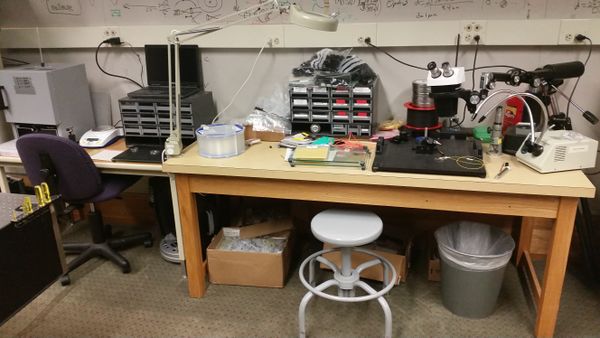Fiber-Optics Obstacle Course
- When working with bare fibers or lasers wear appropriate safety (or laser) goggles. If you're unsure about this please consult the instructor or lab TAs.
Permanent Materials (located at the fiber station):
- Bulk SMF
- Fiber connectors
- Polishing materials
- Free-space-to-fiber coupler
- Fiber chucks
- Fiber mode scrambler
- 50/50 fiber splitter/combiner
- 90/10 fiber splitter/combiner
- 1550/980nm WDM
- 1550nm fiber isolator
- 1550nm in-fiber polarizer
- fiber polarization controller
- 980nm pump laser
- Erbium-Doped fiber
Materials to borrow when necessary
- fiber power meter
- fusion splicer
- CLEAN UP THE OBSTACLE COURSE SETUP AFTER USE
Keep a journal of your activities, results and answers to any questions asked in the activities below. You will use this for your brief write-up.
Activities
- Read the first 4 chapters of John Crisp's eBook, Introduction to Fiber Optics. Consult remaining chapters as needed.
- Read Fundamentals of Photonics Chpt 9 by Saleh & Teich (on APL bookshelf).
- Look over the APL's Fiber Optics Wiki page Fiber Optics and links therein. This info from Newport may be useful as well .
- Consulting Thorlab's Fiber Polishing Manual Fiber Polishing and Connectorization and the (above mentioned) eBook construct a 1 meter SM FC-APC to FC-APC (or FC-PC to FC-PC) fiber patch cable (you will find everything you need at the fiber polishing station).
Fiber Epoxy Mixing Instructions
Fiber Polishing Film Grades - color code/grit size- Measure power loss through your patch cable.
- Read Optical Fiber Fusion Splicing Chpts 1 & 2 by Yablon (on APL bookshelf).
- Break your patch cable in the middle and repair it with a fusion splice (see fusion splicer manual Fusion Splicer Manual and eBook.
- Measure the power loss through your fusion spliced patch cable.
- Optional: Break the fusion splice out of the patch cord leaving two partly-connectorized fibers. Strip and cleave the unconnectorized end of one of the fibers and use the free-space-to-fiber coupler to couple a free space beam into the SM fiber (our coupler is not quite as that shown at the right).
- Measure power loss through your patch cable.
- Use a fiber-to-free-space coupler, free-space polarizer, an in-fiber polarization controller and an IR power meter to measure the polarization extinction ratio (see this explanation for how the polarization controller works).
- Try to create linear polarization with ~ 20dB extinction ratio.
- Try to create circular polarization.
- Use a source, MM fiber, the fiber mode scrambler, the free-space-to-fiber coupler (shown at right) and a video camera to observe the transverse modes of a MM fiber.
- Calculate the V number of the light/fiber system. Read about the V number here.
- Construct an Erbium-Doped SM Fiber Ring Laser. Measure its optical power vs. pump current/power curve.
- Submit a write-up outlining your activities, results and the answers to any questions asked above.
- CLEAN UP THE OBSTACLE COURSE SETUP AFTER USE

